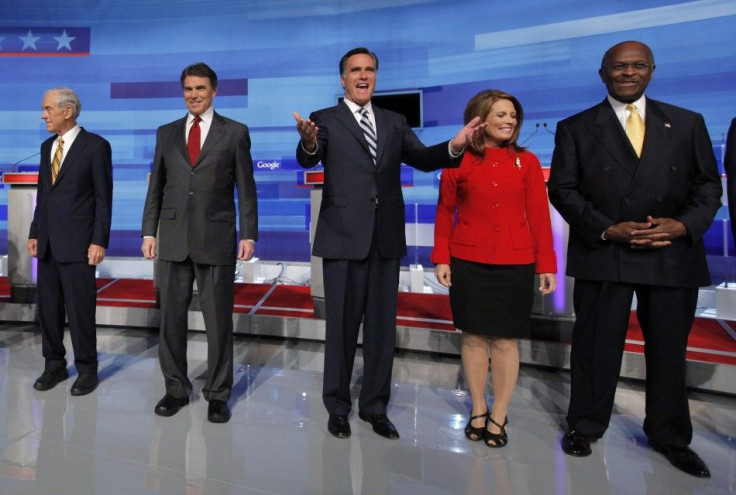Palin Won't Run for President: No More Grasping at Straws, or Republicans Will Lose

It's official: neither Sarah Palin nor Chris Christie is running for president.
Republicans, your field is set.
Many Republicans have spent the past few months hopping from candidate to candidate and desperately searching for a savior who will offer both uncompromising conservatism and electability.
But the game is up. There will be no savior. Like it or not, it is time for Republican voters to take a hard look at the candidates they have and make their pick, even if they have to hold their noses while doing it.
Will it be Mitt Romney? He fares the best of any candidate in hypothetical matchups against President Obama, but he doesn't share the staunch conservatism of much of today's Republican Party, and he has backtracked and rephrased his positions too many times for voters to trust what he says, even if what he says sounds good.
Will it be Rick Perry? He toes the party line on most issues, and among the most conservative candidates in the race, he probably has the best chance against Obama. But voters turned on him after he said he would make the children of illegal immigrants eligible for in-state tuition rates -- proof that in the new Tea-Republican Party, one unorthodox position can be a deal-breaker.
What about Herman Cain? He has the advantage of not having deviated from conservative doctrine on any issue, and that has earned him a remarkable surge into second place in some polls. But he has also never held political office, which calls into serious question his electability, not to mention his fitness to govern.
Could it finally be Ron Paul's year? He has been remarkably successful in extending his appeal beyond his libertarian base, but for better or for worse, many voters still see him as a fringe candidate. Because of that, he is unlikely to attract the level of mainstream support he would need to win the nomination, much less the general election.
What about Michele Bachmann? She was among the frontrunners when she announced her candidacy, but since July, her poll numbers have only gone down. Her campaign has been hamstrung by the resignation of key staff members and by the gaffes Bachmann makes so frequently when speaking, which have earned her criticism even from many conservative Republicans.
Could it be Newt Gingrich? He has more national political experience than any of the other candidates, having been a congressman for 20 years and speaker of the House after the 1994 Republican Revolution. He has also made an impressive comeback since the mass resignation of his top advisers in June left his campaign for dead, and Tea Party founder Judson Phillips recently endorsed him. His is still a long-shot candidacy, but if any of the current second- and third-tier candidates is to pull off an upset, Gingrich seems to be the strongest contender.
The other candidates -- Rick Santorum, Jon Huntsman and Gary Johnson -- have 2 percent support or less in recent polls, and it would take a turnaround of historic proportions to put them even within striking range of the nomination. Stranger things have happened in previous election cycles -- but in previous cycles, the primaries were not scheduled to begin in January, as they are now.
Republicans in 2012: Grasping at Straws
No one can blame the Republicans for grasping at straws; it is obvious that their field leaves a lot to be desired. Many of these candidates would be steamrollered even by an unpopular President Obama, because they are either inexperienced or too conservative for the general electorate. Meanwhile, the candidates that could compete against Obama aren't conservative enough for the Republican electorate.
This is a serious dilemma, but it is a dilemma of Republicans' own making. They want something they can't have: an electable candidate who is conservative on every issue, with no chinks in his or her record, and who will never compromise on those issues.
It was never really about Palin or Christie. Neither of them met the requirements: Palin was unelectable and Christie too moderate. What they were was potential new faces in a crowd of old, unappealing faces. When all you have is nails, every tool looks like a hammer.
At this rate, it would not be surprising to see the 2012 elections turn out like the 2004 elections, when the Republican incumbent, George W. Bush, was very unpopular and the election was the Democrats' to lose -- and they lost it because they could not come up with an inspiring candidate.
The 2004 Democrats chose the blandest of the options before them, Massachusetts Sen. John Kerry, and hoped that by pushing an anybody-but-Bush message, they could win without presenting a compelling alternative of their own. Needless to say, that plan didn't work.
Today's Republicans understand that they are in a similarly precarious position, and that is why they are trying so frenetically to find that compelling alternative. At some point, though, they are going to have to accept that there is no compelling alternative to be found.
There is no candidate who offers everything Republicans want. If the Republicans choose wisely from the candidates before them and put all their energy toward making that candidate compelling, they will have a good chance of beating President Obama next year. But if they continue to grasp at impossible alternatives to the current field, they will lose.
It really is that simple.
© Copyright IBTimes 2024. All rights reserved.





















